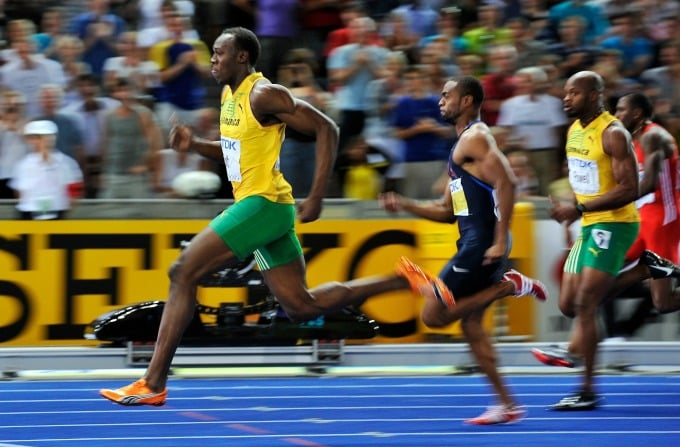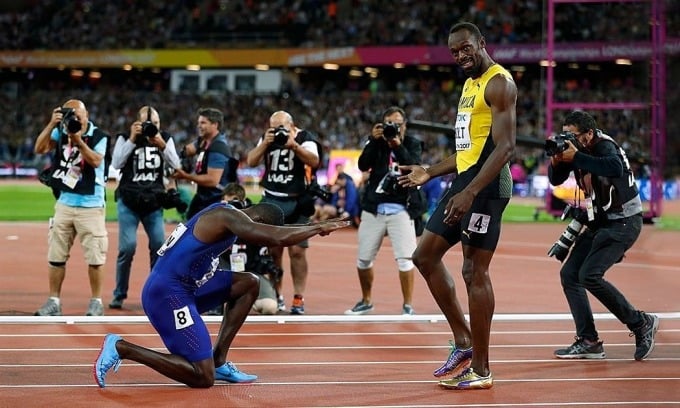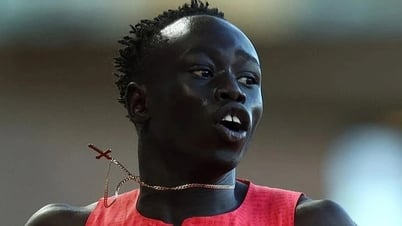Research indicates that humans can run at a maximum speed of 65 km/h, significantly faster than the fastest speed of legendary Usain Bolt when he set the 100m record in 9.58 seconds.
The human body is capable of extraordinary physical feats. Weightlifter Hafthor Julius Bjornsson successfully lifted 501kg in the deadlift. Usain Bolt holds the 100-meter record in 9.58 seconds. An Olympic athlete can reach a running speed of 35 km/h. So how fast can an average person, without the training abilities or genetic makeup of a world champion, run?
According to a study by Run Repeat based on over 34 million race results, the average human running time is approximately 35 minutes for 5km , 1 hour and 2 minutes for 10km, 2 hours and 14 minutes for a half marathon (21.0975 km), and 4 hours and 26 minutes for a full marathon (42.195 km).

Usain Bolt surged ahead to take the lead before finishing first with a record-breaking time of 9.58 seconds in the men's 100m final at the 2009 World Athletics Championships in Berlin, Germany. Photo: AFP
Another dataset based on 10,000 race results shows that the average time to run 1 mile (1.6km) in a 5km race is 11 minutes and 47 seconds. This means it takes you 11 minutes and 47 seconds to run 1.6km and 36 minutes and 37 seconds to run 5km – quite close to the Run Repeat data.
But it's important to note that this data is collected from race results. Just because a runner is running a race doesn't mean they're running at their fastest possible speed. Some runners run for recreation or to maintain a pace to help their friends lead.
So what is the maximum running speed of a human? Any numbers on this matter are mostly speculation. Usain Bolt still holds the title of the fastest runner in the world, so the Jamaican legend's maximum speed can be considered the fastest achievable by a human, until Bolt's record is broken. When setting the 100m record with a time of 9.58 seconds in 2009, Bolt achieved an average speed of 37.58 km/h. His highest speed over this distance was 44.72 km/h.
However, some scientists believe that humans can run at speeds of up to nearly 65 km/h. Specifically, a 2010 study used computer models to show that, based on the weight that each individual human muscle fiber can withstand before breaking, the world's fastest runners may not yet be running at their full potential.
However, computer models are purely theoretical. Therefore, the maximum speed of a human, in reality, remains Bolt's record of 44.72 km/h. Surprisingly, some scientists believe that humans could only become faster if they started running on all fours.

Gatlin knelt in admiration despite having just defeated Bolt at the 2017 World Championships in London, the last major competition before the "Jamaican Lightning" retired. Photo: AP
Many factors influence a person's running speed, and these can vary daily, such as mood, effort, fitness level, conditions, attire, race terrain, hydration, training volume, sleep time the night before the run, experience, genetic and physical factors, and even mood and the type of music listened to while running.
So how can the average person run faster? Your running ability is partly determined by genetics, but even those who aren't naturally fit can improve through training and investing in appropriate running gear.
Running faster requires a lot of effort and dedication. You'll need to improve your stamina and endurance along with your speed to achieve the best results by engaging in various forms of training.
The following are types of running exercises that can help you improve your speed, according to experts at Verywell Fit .
Tempo running: This type of running helps you develop anaerobic thresholds. The workout involves starting at an easy pace for 5 to 10 minutes, then slowing down by about 10 seconds compared to your 10km pace for 15 to 25 minutes, and then finishing with another 5 to 10 minutes of easy running.
Interval running: A running workout will consist of fast running segments followed by segments of light running or walking. This type of running helps you develop both speed and endurance simultaneously.

Consistent, regular, and proper training can help average-sized people run faster. Photo: Coros Stories
Fartlek running: Fartlek running is similar to interval running, except it relies more on feel. It's a great option when you've planned an interval run but feel tired.
Running uphill: Running on hills or slopes helps strengthen your legs and lungs, allowing you to run faster.
Trail running: Changing the terrain can help you run faster than on flat roads.
Long runs: Even if you don't intend to run long distances, doing a few long runs will significantly impact your endurance, making it easier for you to run faster over shorter distances.
Sprinting: Pushing yourself to the limit during your runs is a sure way to get stronger. Try adding sprint sessions to your training plan once or twice a week to improve your speed.
Light running: Spending a few days running lightly will greatly benefit your running speed. Your body always needs time to recover and adapt to any training you're undergoing.
Hong Duy (according to Verywell Fit )
Source link
















































































































Comment (0)